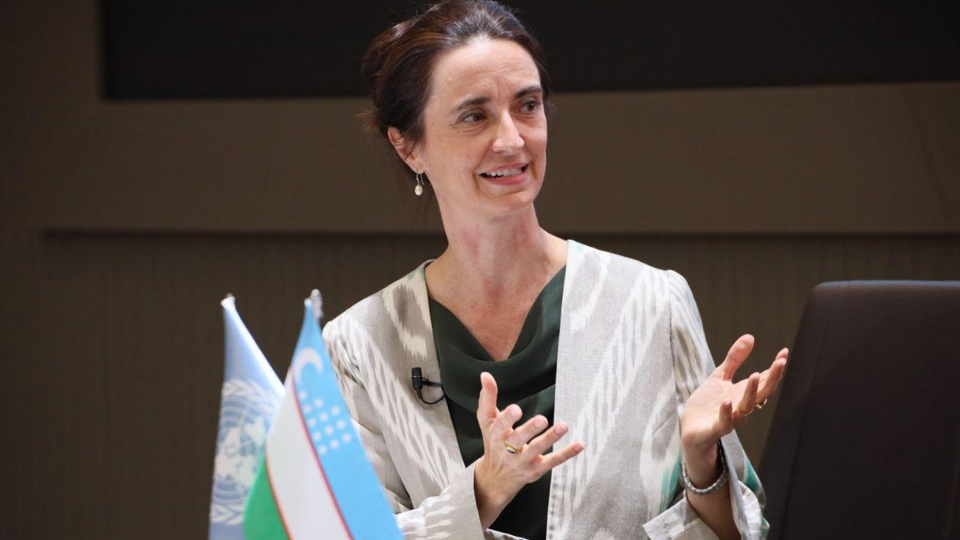Hand over the mic to: Helena Fraser
UN Resident Coordinator in Uzbekistan, advocate for women’s rightsDate:

For the 16 Days of Activism against Gender-Based Violence, we are handing over the mic to women on the front line, those who are battling COVID-19 and the pandemic of violence against women and girls that’s relentless and rising. These are the voices of survivors, essential workers, and leaders, telling us what’s urgent, and how we can stop the escalating violence, recover and rebuild from COVID-19.


In Uzbekistan, we now have a groundbreaking new law on violence against women and this provides an enabling environment for the UN system. The COVID-19 pandemic came in this context. We have seen a confirmed increase in the number of cases of domestic violence during the pandemic, particularly during the period of tight lockdown. At the same time there is a deficit in data collection.
What can you do to help?
- Acknowledge the phenomenon of gender-based violence
- Lift the taboo on speaking about it
- Teach your children about the issue
From June to July 2020, there were, according to the Ministry of Internal Affairs, 202 cases of crimes against women, 54 per cent of which concerns psychological violence, 44 per cent physical violence and the remaining cases economic violence. As in many countries, we consider that this is a significant underreporting.
Thanks to the new legal framework, we've also seen an increase in the support provided to survivors of gender-based violence. For example, in the period between February and 1 November 2020, 8,431. protection orders were issued.
As the UN family, we wanted to ensure that we don't go backwards on gender equality during this very challenging period. We have put in place a number of projects seeking to enhance services to survivors of gender-based violence and also enhanced data collection so that we have more evidence with which to ensure government can make good decisions.
The UN Political Engagement Strategy [which aims to accelerate concrete policy response to gender-based violence in the context of COVID-19] is very timely. Because it provides us a hook with which to continue to put the issue of gender-based violence high on the political agenda. As soon as we received the information about the engagement strategy, we had a UN gender theme group meeting, not just with our UN family colleagues, but also with other like-minded development partners for whom gender equality and women's empowerment are important objectives, to build a coalition of support. My role is to keep raising this issue on the agenda, keep building on that coalition of partners to push for a shift in policy, in practice, in societal norms and in services that are required for us to achieve our objective.
I am glad that in the country in which I'm serving, there is a positive trajectory to move this agenda forward and there is commitment at high level.”
UN Women programmes work to tackle gender-based violence and support survivors
Helena Fraser is the UN Resident Coordinator for Uzbekistan since July 2017. She leads the United Nations Country Team in Uzbekistan in support of national sustainable development priorities and Agenda 2030.
In 2019, Uzbekistan adopted two new laws on gender equality, to provide equal rights and opportunities for women and men, as well as protection of women from harassment and violence. The UN Country Team in Uzbekistan supported the government with the development of these laws.
During the COVID-19 pandemic, the UN Country Team in Uzbekistan sustained service delivery for survivors of violence and accelerated comprehensive multi- sectoral responses to violence against women and girls. The UN Country Team also prioritized socio-economic support to women, in particular rural women and young women, in terms of skills development to counter the negative impact of the pandemic.
UN Women works as a member of the UN Country Team in Uzbekistan to advance international commitments on gender equality and women's empowerment.